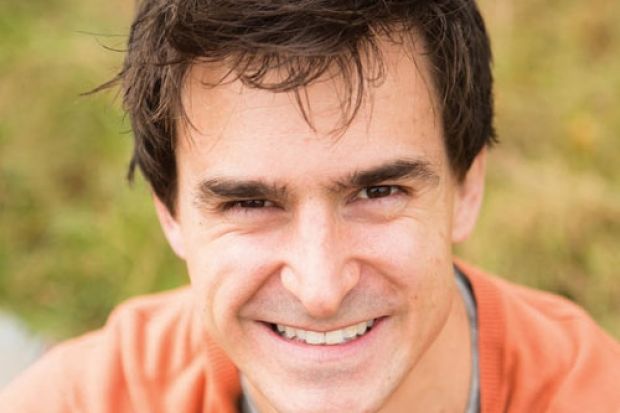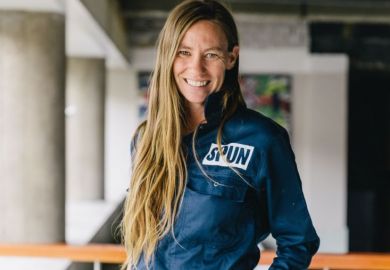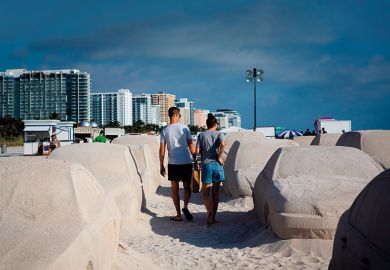Imagine that everything we take for granted disappears tomorrow in a cataclysmic global event, and modern civilisation as we know it is all but obliterated. What would we need to know in order to rebuild a civilised, functioning society? This question sits at the core of The Knowledge, which Lewis Dartnell claims will “transform your understanding of the world – and help you prepare for when it’s no longer there”.
The premise for The Knowledge is simple: despite living in a developed nation, we have become disconnected from the knowledge, processes and skills that sustain us in our everyday lives. We take it for granted that whatever information we need, whenever we need it, can be found at our fingertips – literally. However, where once we used our memories and physical artefacts to record and store information, we now find ourselves largely reliant on virtual resources, where knowledge exists as bits of digital data on hard drives, or in clouds accessed from remote servers via the internet. How, then, will we find out what we need to know to survive if the lights go out for good?
First impressions might be that The Knowledge is just another “prepper’s manual”, regurgitating basic survival information that is already widely (and freely) available. But Dartnell’s book attempts to fulfil a different and arguably more significant purpose – that of setting out the fundamental scientific knowledge and processes necessary for mankind not just to survive, but to gradually rebuild a society capable of making the scientific and technological advances that have brought us to where we are today.
The key message is that, in the aftermath of the apocalypse, we cannot take even the most fundamental knowledge for granted
Dartnell approaches his narrative as a thought experiment – a hypothetical exploration of the essential knowledge needed to reboot civilisation. He covers this vast territory by taking the reader on a whirlwind tour of the history of human endeavour in terms of scientific and technological discovery, with an overview of the scientific principles and processes essential to meeting societal needs. There is certainly plenty to consider, from sourcing the seeds necessary to restart agriculture, through developing automated machinery and instigating the industrial production of chemical compounds, to creating sophisticated transport and communications networks. The key message is that, in the aftermath of the apocalypse, we cannot take even the most fundamental knowledge for granted. Working out where we are, what time of day it is and how to perform the most basic physical measurements will all need to be rethought from first principles.
Where you start, of course, depends on how things have ended, and Dartnell’s “ideal” scenario is a fast-spreading, viral pandemic in which the human population is practically obliterated, but where the majority of resources remain intact. While this makes for a useful jumping-off point in terms of exploring the essentials for a societal rebuild, it would have been interesting to consider some of the alternative apocalyptic scenarios mentioned in the opening chapters, but which are not developed further, eg, the aftermath of a nuclear strike (some loss of life, but total devastation of landscape and resources) or a massive coronal ejection (no loss of life, but total loss of power and communications). These discussions need not necessarily be confined to the pages of a book, however: a dedicated website at www.the-knowledge.org and a Twitter feed (@KnowledgeCiv) provide opportunities for readers to become actively engaged in, and widen, the conversations started in The Knowledge.
One of the most interesting questions to emerge from The Knowledge is how society might evolve the second time around. Will our quest to rediscover and relearn complex processes result in the same chance discoveries, such as X-rays, or might we accelerate our progression by leap-frogging over redundant stages in the development process? It also paves the way for a “green reboot” – in fact this seems almost inevitable since, as chemist and physicist Sir William Crookes noted in 1898, “we are drawing on the Earth’s capital, and our drafts will not perpetually be honoured”. Having depleted the Earth of a significant proportion of its fossil fuels, society will need to reconsider its requirements in terms of resources and energy consumption, and look to alternative sources of fuel and power. In the absence of industrialised chemical plants, at least for the first few generations, farming and agriculture will be organic by default, while an alternative economy will evolve as the items needed for survival gain currency over money.
Where The Knowledge really succeeds is in demonstrating the interconnectedness of knowledge, the importance of the scientific method in advancing society, and the “symbiotic relationship” between scientific discovery and technological advance. The interconnections are complex, and it would be interesting to see them mapped out visually in addition to being cross-referenced within the text. However, I think the pitching of the text is occasionally off-target for a popular science book. A general readership might struggle with some of the more technical language, or with detailed descriptions of complex machinery or abstract chemical processes (a glossary would certainly be helpful). Meanwhile, other seemingly important topics such as acid production appear glossed over, and are not considered in sufficient detail to be of practical value. This left me questioning how much of The Knowledge the layperson could, if push came to shove, actually put into action.
I also feel that more attention might have been paid to the societal implications of a post-apocalyptic reboot. While it makes for a neater and simpler discussion to strip away the influence of politics, economics or religion, in reality any future advances in science and technology will be intimately intertwined with human processes – just as they have been throughout history. Again, this may be a discussion that’s best carried over into the realm of social (or other) media, in which case I look forward to watching it unfold.
Dartnell has set himself a mighty, and courageous, task with The Knowledge, and in the main I think he succeeds. This book has certainly ignited my interest and curiosity to learn more about some of the scientific principles and processes critical to our existence, and the manual skills needed to keep the world going. I thoroughly enjoyed taking myself on a magical mystery tour of the internet and YouTube (via my loft to dig out my old A-level notes!) to explore further how science and technology have evolved, and how exactly certain processes work in practice. It’s a shame to think that Society 2.0 won’t have the benefit of watching James May explain how to make glass from sand, or a qualified engineer recount the finer details of absorption refrigeration.
So does The Knowledge deliver on its claim that it will “explain everything you need to know about everything”? Of course not. But it does explain an awful lot about the workings of our world in a way that is engaging, thought-provoking and (mostly) accessible. And while I’m not sure it will “transform our understanding of the world”, readers will certainly come away better informed, more knowledgeable about, and hopefully more interested in the fundamental science and technology necessary to rebuild a civilised society. Finally, will The Knowledge help us prepare for when the world as we know it is no longer there? There’s only one sure-fire way to answer that question, and to be honest that’s knowledge I can happily live without.
The author
Astrobiologist Lewis Dartnell, UK Space Agency research fellow in the University of Leicester’s Space Research Centre, was born in the UK. “But I spent a lot of time throughout my childhood living abroad – my dad was an engineer for British Airways and so was sent on long overseas postings. My formative years were spent in school in Nairobi, Kenya, where of course a great fraction of the population has a much less privileged lifestyle than us in the developed world.
“I’ve always marvelled at how good Dad is with his hands, fixing things and just having an intuitive sense of mechanisms. I joked with him that most of the time with the arriving aircraft he just filled ’em up with fuel and checked the tyre pressure, but every now and then there was a more serious problem that would take hours to sort out. For example, changing the entire turbojet engine on a jumbo jet: carefully removing the malfunctioning engine, swapping it with a replacement and meticulously reconnecting all the fuel lines and control interfaces, like a metallic surgical operation.”
Dartnell adds: “I’ve always been more book-smart, but have always envied the practical skills in others around me.” He would, he says, “trade a kidney for a better memory…I have a memory horizon of about a fortnight, so if I don’t note something down in writing it evaporates back out of my mind almost instantly.”
He and his wife Vicky live in Stoke Newington, which to the best of his memory is “a lovely little pocket of North London, but a long train commute from my research lab at the University of Leicester. Vicky’s an HIV-specialist doctor, and so although we both have ‘Dr’ before our names, she’s actually the useful kind.”
As a child, he “always enjoyed school and learning new things. I was the first in the family to go to university, and my parents and grandfather were always very supportive of my geek tendencies, feeding me with books, science kits and a second-hand computer when I was 12 (a VIC-20!) so I could teach myself coding.”
Dartnell took his undergraduate degree at the University of Oxford and his doctorate at the Centre for Mathematics and Physics in the Life Sciences and Experimental Biology, University College London. What sort of undergraduate was he? “A biologist,” he parries, and then adds, “It’s certainly true that your university years are among the best of your life, and many of my closest friends are from Oxford. But I always knew I wanted to go into scientific research after graduating and so worked hard at my degree.”
The Knowledge, he admits, “isn’t actually about the apocalypse at all, but is about how our world was built, and about the elegant principles and processes that underlie our everyday lives. I’m a research fellow in astrobiology, but my direct expertise lies in such a focused field of academia that before investigating and writing the book I was as oblivious as most other people to the actual workings of civilisation and the history of its development. I certainly don’t intend to make people feel guilty for not already knowing a lot of science, but I find that I appreciate things much more once I know how they work, and I wanted to share that fascination.”
Dartnell is a senior editor of the peer-reviewed journal Astrobiology. Asked if laypeople express surprise that there is a field of study known as astrobiology, or indeed that there is a scholarly journal devoted to it, he responds: “What’s wonderful is that people almost always seem to be interested in the subject when they ask me what kind of science I do, and then ask lots of questions and really get into chatting about it.
“Astrobiology is all about looking into the possibility of life beyond the Earth (I focus on possible bacteria on Mars) and I think that it’s one of those questions that everyone’s already thought about themselves, or had talked about with family at home or friends in the pub. I think what people do find surprising is just how far we’ve come in only the last decade, and the latest discoveries to do with the incredible resilience of life on Earth, the environment on Mars or finding increasingly Earth-like planets orbiting other suns in the galaxy.”
He admits that “of course” he will be disappointed if extraterrestrial life of some kind is not discovered during his lifetime.
“The nature of research and exploration is that you never quite know what you’re going to find, or when (it wouldn’t be science if you already knew the answer to the question). But I think there is a good enough chance that there is, or was, microbial life on Mars that we’d be able to detect it with the instruments we equip our rovers with within the next few decades. But actually, if I were a betting man, I suspect that if life were out there we’d spot the distinctive signature of oxygen in the atmosphere of a terrestrial planet orbiting a nearby star before we find signs of fossilised bacteria on Mars.”
As for the moral and philosophical impact of such a discovery on higher life forms back on Earth, Dartnell suggests that “if the alien life we discover is ‘just’ long-since extinct fossilised bacteria on Mars, or the oxygen-signature of a biosphere on a remote exoplanet, then the implications would still be utterly profound.
“We’d realise that we’re not alone in the universe, and that even life itself is a common thing to emerge. Knowing that the Earth isn’t unique in being a living world would be the final, and most important, stage in the Copernican revolution – coming to terms with the fact that our status in the universe isn’t special, that the Earth isn’t the centre of the universe and that we orbit the Sun rather than visa versa. I think the discovery will be as historically important as realising the world isn’t flat, but I don’t think it will change everyday life to a great extent.”
A public-engagement and media veteran, Dartnell’s television appearances have included sharing the small screen with the late Sir Patrick Moore on The Sky At Night. Asked if he thinks our expectations of “scientists on the telly” have changed since that programme began broadcasting in 1957, Dartnell says: “I think it’s certainly a good thing that researchers have the opportunity to present the wider context of their science and its importance to our society, and it’s something that I clearly enjoy doing myself.
“Obviously aspects like the quality of graphics and special effects (particularly with computer animations nowadays) have improved enormously since Patrick first started broadcasting, but it’s important to make sure the eye-candy and whizz-bang demos don’t interfere with good story-telling, the sense of awe and wonder in the world around us, and of course the accuracy of the content.”
Invited to give his opinion on whether space scientists are indeed the rock stars of science, he responds modestly, “You tell me!”
Karen Shook
The Knowledge: How To Rebuild Our World From Scratch
By Lewis Dartnell
Bodley Head, 352pp, £20.00 and £11.98
ISBN 97818479224 and 9781448137381
Published 3 April 2014
Register to continue
Why register?
- Registration is free and only takes a moment
- Once registered, you can read 3 articles a month
- Sign up for our newsletter
Subscribe
Or subscribe for unlimited access to:
- Unlimited access to news, views, insights & reviews
- Digital editions
- Digital access to THE’s university and college rankings analysis
Already registered or a current subscriber? Login





